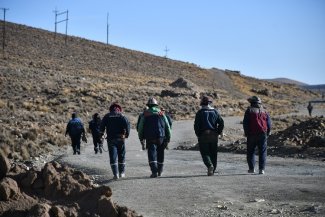
Rows of makeshift barricades block all entrance roads to Istanbul’s Taksim Square.
Masked youths standing in front of the newly created obstacles guard the roads from police advance, regularly engaging them in fierce battles in a bid to expand protests throughout the city.
Next to one of these red brick barriers, sprawling across the street in the hip middle-class neighborhood of Cihangir, is graffiti in Turkish. Scrawled on a lamppost above a sandy concrete floor where a sidewalk once lay translates the Paris 1968 slogan: “Beneath the paving stones, the beach.”
What started as a small environmental protest against the uprooting of trees to build a shopping mall has bloomed into a broad urban revolt in cities across Turkey, galvanized by a harsh police crackdown and an uncompromising response from Prime Minister Recep Tayyip Erdogan.
Three people have been killed, and thousands injured and detained by police across the country since activists began a sit-in in Gezi Park on 28 May.
Now, the protests are against what people increasingly see as an arrogant turn towards authoritarianism by Erdogan’s religiously conservative and neo-liberal Justice and Development (AKP) government after ten years in power.
In response Erdogan has dismissed the protesters as fringe hooligans and blamed Twitter – which many people have turned to in response to lack of coverage in local press – as the worst menace to society.
In front of a forcibly closed Starbucks, an activist medic stall sits alongside a free food collective. Intermixed with the tents filling the park are street vendors selling everything from grilled meat sandwiches to goggles and masks for teargas.
Every day, by the late afternoon, tens of thousands of people pack the square and the encampment in Gezi Park, just behind Taksim, in what is a constant festival atmosphere.
Turkish and leftist flags of all stripes drape statues and buildings while burned out cars, buses, media vans and armored police vehicles litter the area as scorched earth monuments to the police retreat after mass street fights last weekend.
This popularly reclaimed protest site is a first in a country where the police are known for regularly cracking down on Kurds and leftists, as well as dispersing the smallest and most innocuous demonstrations.
Occupy Gezi, as this movement is often called, contrasts vividly with the surroundings of expensive hotels and upscale shops, and the protests are generating a budding counter-culture in with many similarities to the 2011 Occupy New York camp in Zuccotti Park.
At the same time, the political focus on state control and security crackdowns alludes to the discontent that propelled the Arab revolutions.
Nonetheless, while the protests illustrate all the hallmarks of the negated youth who have taken over public squares worldwide in a bid for recognition and engagement, the social opposition in Turkey is the result of the local political landscape.
It does not easily fit within the framework of economic discontent in the West or the demands for bread and freedom in the Arab World.
“Soldiers of Kemal”
On the barricades, leftists, republicans, the LGBT community, nationalists and a handful of Kurds collectively face-off against the police while in the park they drink (in part to defy the AKP’s plans to restrict alcohol sales) and debate along Turkey’s political divides.
As clashes began on edge of the football stadium en route to one of Erdogan’s offices on Tuesday night, the young crowd began chanting at the police: “We are all soldiers of Kemal [Atatürk].” It’s a call commonly heard around the protests referring to the founder of modern Turkey and its particular brand of secular, ethno-nationalist republicanism.
Irritated, Emre Elmekci, a Kurdish activist in his mid-20s wearing a gas mask and standing metres from a poised water canon turns to me and says: “I can’t join in this, I’m not a soldier of Kemal,” he says referring to the ideology that forcefully denies the existence of Kurdish identity.
However, moments later the chant changes to “shoulder to shoulder we stand against fascism,” and Elmekci becomes as boisterous as anyone else.
Even as the issue of building a shopping mall is eclipsed by police brutality and a generation finding a collective voice of opposition after spending nearly half their lives under Erdogan’s government, the layered symbolism of the intended construction encapsulates the discontent.
“What the mall is actually about is the corrupt relationship between this government and the powerful business people close to it,” says Burak Arikan looking onto Gezi park from an adjacent cafe.
Arikan, a tall, bearded man in his mid-thirties, is an activist with Taksim Solidarity, the main coalition group organising the protests.
At the same time, the image of harking back to the Ottoman Empire by building the plaza within a reconstructed Ottoman army barracks has enraged nationalists and republicans. For them, Taksim, its statues and Gezi Park are a cherished symbol of the 1920s Republic which sought to replace the legacy of a defeated empire with a new westernized republican state and identity.
“Erdogan wants to divide the country in the same way that has happened in the Arab world so he can change the constitution,” says Basak Ildiz, a young, secular, republican woman who works in higher education and feasr religious influence in the state. Sitting in Gezi Park as tear gas dropped from a police helicopter wafts over, she expresses concern that Erdogan is trying to use the situation to advance a religiously conservative agenda and consolidate power.
Open opposition
It is this mix of Turkish capitalism that has produced a long lasting economic boom for the country’s wealthy and a religious and historic cultural conservatism – enforced by a police clampdown – that has pulled together such a broad and explosive opposition in Taksim. Meanwhile, the atmosphere of budding revolt has provided an opening for previously repressed groups to openly mount their grievances.
As a result, the labour movement is actively joining the protests and Turkey’s largest public and private sector unions – Devrimci Isçi Sendikalari Konfederasyonu (DISK, or the Confederation of Progressive Trade Unions in Turkey) Kamu Emekçileri Sendikalari Konfederasyonu (KESK, or the he Confederation of Public Workers’ Unions) – started a series of strikes on Tuesday and Wednesday, generating a cross-class dynamic to the opposition.
The site of a 1977 Mayday massacre of dozens of union activists and leftists in an attack many believe to be orchestrated by Turkey’s then anti-guerilla security forces, Taksim Square is iconic for the Turkish labour movement.
Following the 1977 events, unions were barred from rallying in the square for three decades until 2007 when they fought pitched battles with the police to take Taksim.
This year again, labour led a Mayday march demanding secure collective bargaining and organizing rights. They were met by nearly 20, 000 police officers who filled the square and used water cannons and teargas in a bid to keep protesters from Taksim.
Though the AKP has been credited with saving Turkey from the near economic implosion faced by the rest of Europe, the unions have long opposed the government’s neo-liberal policies, contending that workers have not seen the benefits of a strong Turkish economy.
According to Arzu Cherkezoglu, the General Secretary of DISK – representing an estimated 400 000 private sector and blue-collar public workers – there is now an opportunity to launch the demands silenced last month.
Sitting at a café in a side street off the upscale shopping street Istiklal, where the expensive stores have become spliced with trashed banks and partially occupied buildings, our conversation is interrupted as the clock strikes 21.00.
Noise makers are heard everywhere and people in the streets stop to cheer ruckus and chant protests slogans in what has become a decentralised popular tradition of defiance.
“This is a popular movement and we want to be a part of it,” says Cherkezoglu, a medical doctor by training in her mid-forties. “The political and social freedoms people are fighting for – the end of police repression, the right to freely assemble and organise, and the resignation of the government – are things we have been demanding for a long time,” she adds.
At the core of labour’s discontent is the continued rising cost of living which is not met with comparable rising wages, weak workplace safety protection, and stringent labour laws restrict unions from organising beyond their narrow trades.
In response, the strikes and protests have drawn the ire and condemnation of a government now coping with an expanding opposition for the first time since it was elected to power.
As protestors flow in and out of the square there is an increasing diversity of people setting up tents in Gezi Park, talking and tweeting to each other and the world. Insulated behind a labyrinth of barricades they are freely starting a long stalled social discussion about a booming Turkey in transition.








